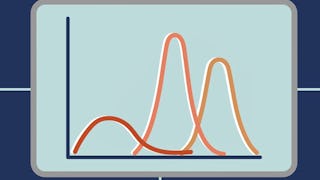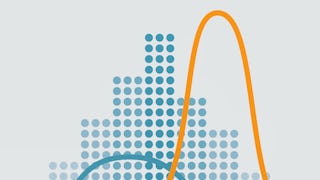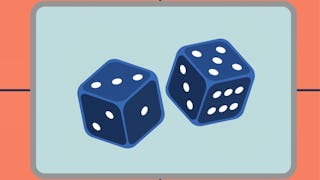This is the second of a two-course sequence introducing the fundamentals of Bayesian statistics. It builds on the course Bayesian Statistics: From Concept to Data Analysis, which introduces Bayesian methods through use of simple conjugate models. Real-world data often require more sophisticated models to reach realistic conclusions. This course aims to expand our “Bayesian toolbox” with more general models, and computational techniques to fit them. In particular, we will introduce Markov chain Monte Carlo (MCMC) methods, which allow sampling from posterior distributions that have no analytical solution. We will use the open-source, freely available software R (some experience is assumed, e.g., completing the previous course in R) and JAGS (no experience required). We will learn how to construct, fit, assess, and compare Bayesian statistical models to answer scientific questions involving continuous, binary, and count data. This course combines lecture videos, computer demonstrations, readings, exercises, and discussion boards to create an active learning experience. The lectures provide some of the basic mathematical development, explanations of the statistical modeling process, and a few basic modeling techniques commonly used by statisticians. Computer demonstrations provide concrete, practical walkthroughs. Completion of this course will give you access to a wide range of Bayesian analytical tools, customizable to your data.

Early bird sale! Unlock 10,000+ courses from Google, IBM, and more for 50% off. Save today.


Bayesian Statistics: Techniques and Models
This course is part of Bayesian Statistics Specialization

Instructor: Matthew Heiner
Top Instructor
57,082 already enrolled
Included with 
(491 reviews)
What you'll learn
Efficiently and effectively communicate the results of data analysis.
Use statistical modeling results to draw scientific conclusions.
Extend basic statistical models to account for correlated observations using hierarchical models.
Skills you'll gain
Details to know

Add to your LinkedIn profile
17 assignments
See how employees at top companies are mastering in-demand skills

Build your subject-matter expertise
- Learn new concepts from industry experts
- Gain a foundational understanding of a subject or tool
- Develop job-relevant skills with hands-on projects
- Earn a shareable career certificate

There are 5 modules in this course
Statistical modeling, Bayesian modeling, Monte Carlo estimation
What's included
11 videos4 readings4 assignments1 discussion prompt
Metropolis-Hastings, Gibbs sampling, assessing convergence
What's included
11 videos7 readings4 assignments
Linear regression, ANOVA, logistic regression, multiple factor ANOVA
What's included
11 videos5 readings5 assignments1 discussion prompt
Poisson regression, hierarchical modeling
What's included
10 videos7 readings4 assignments1 discussion prompt
Peer-reviewed data analysis project
What's included
1 video1 reading1 peer review
Earn a career certificate
Add this credential to your LinkedIn profile, resume, or CV. Share it on social media and in your performance review.
Instructor

Offered by
Explore more from Probability and Statistics
 Status: Free Trial
Status: Free Trial
University of California, Santa Cruz


Duke University
 Status: Free Trial
Status: Free Trial
University of California, Santa Cruz
 Status: Free Trial
Status: Free Trial
Illinois Tech
Why people choose Coursera for their career




Learner reviews
491 reviews
- 5 stars
82.89%
- 4 stars
13.03%
- 3 stars
2.03%
- 2 stars
1.01%
- 1 star
1.01%
Showing 3 of 491
Reviewed on Dec 10, 2018
Great materials and well organized lecture structure. But in the meanwhile, it requires quite a lot preliminary knowledge.
Reviewed on Jun 18, 2018
Brilliant course! Very well organized and with useful study cases.Suggestion: It would be nice to have the same examples in Python using, e.g. Stan or PyMC.
Reviewed on Jul 7, 2018
This is a great course for an introduction to Bayesian Statistics class. Prior knowledge of the use of R can be very helpful. Thanks for such a wonderful course!!!

Open new doors with Coursera Plus
Unlimited access to 10,000+ world-class courses, hands-on projects, and job-ready certificate programs - all included in your subscription
Advance your career with an online degree
Earn a degree from world-class universities - 100% online
Join over 3,400 global companies that choose Coursera for Business
Upskill your employees to excel in the digital economy
Frequently asked questions
Access to lectures and assignments depends on your type of enrollment. If you take a course in audit mode, you will be able to see most course materials for free. To access graded assignments and to earn a Certificate, you will need to purchase the Certificate experience, during or after your audit. If you don't see the audit option:
The course may not offer an audit option. You can try a Free Trial instead, or apply for Financial Aid.
The course may offer 'Full Course, No Certificate' instead. This option lets you see all course materials, submit required assessments, and get a final grade. This also means that you will not be able to purchase a Certificate experience.
When you enroll in the course, you get access to all of the courses in the Specialization, and you earn a certificate when you complete the work. Your electronic Certificate will be added to your Accomplishments page - from there, you can print your Certificate or add it to your LinkedIn profile. If you only want to read and view the course content, you can audit the course for free.
If you subscribed, you get a 7-day free trial during which you can cancel at no penalty. After that, we don’t give refunds, but you can cancel your subscription at any time. See our full refund policy.
More questions
Financial aid available,

